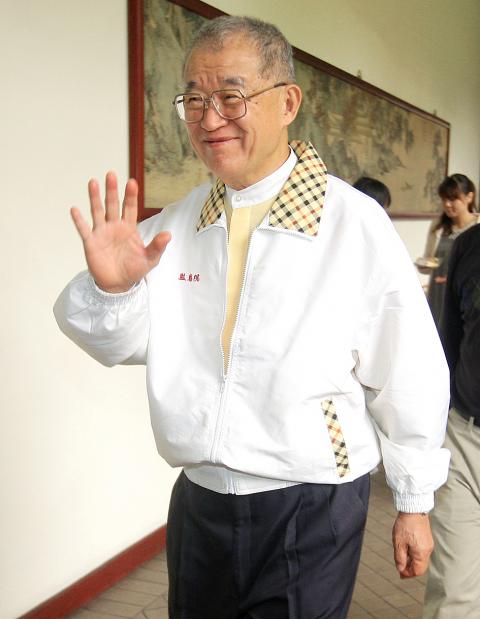The “biggest mistake of my life” was taking up the position of Control Yuan president in 2008, Wang Chien-shien said yesterday.
The outgoing president added that the Control Yuan has failed the public’s expectations.
Wang compared his Control Yuan presidency with incarceration, saying he was happy that he “would be discharged from prison soon,” ahead of his six-year term expiring at the end of July.

Photo: CNA
Asked about his regrets, Wang said that the Control Yuan, under his leadership, has failed to meet public expectations, which he attributed to some members without identifying them.
“Some of the Control Yuan members were nice people when they were appointed to the position, but they completely changed after they started wielding power. Absolute power drives a person crazy,” Wang said.
However, he said that he was not in a position to bring Control Yuan members “who are not like me” back to the right track, because each Control Yuan member should be allowed to work independently without any interference.
Wang said he could not agree more with his predecessor, Wang Tso-jung (王作榮) — who died in July last year — when the latter said that being president of the Control Yuan is very boring, because the job merely entails the rubber-stamping of documents, spending public money and socializing over meals.
“Any bodhisattva statue from the Zhinan Temple (指南宮) placed in the top position at the Control Yuan could do a better job than Wang Chien-shien,” Wang Chien-shien paraphrased his predecessor as saying.
Wang Chien-shien gave a thumbs-up to Hon Hai Technology Group chairman Terry Gou (郭台銘), who on Thursday called a press conference and derided the value of democracy after a recent spate of protests that followed the student-led Sunflower movement protests.
“Gou was right by saying: ‘Democracy makes no pottage,’” Wang Chien-shien said.
“Like the question: ‘Love or bread?’ points out, one can die without bread. If Taiwan cannot keep its economy growing, what kind of democracy is that?” he asked.
“Many people think that Taiwan is a beacon of democracy to the world and its democracy is a positive encouragement for people in China, but can Taiwan continue to serve as a model of democracy for other countries? I think it will only take a toll on them [other countries],” Wang Chien-shien said.
His remarks drew negative comments.
Former Democratic Progressive Party chairman Hsu Hsin-liang (許信良) said Wang Chien-shien did not get much done during his tenure.
“He should have been able to do something, but he did nothing,” Hsu said.
Chinese Nationalist Party (KMT) Legislator Tsai Chin-lung (蔡錦隆) said he wished that Wang Chien-shien could “disappear from the public eye as soon as possible.”
DPP Legislator Lee Ying-yuan (李應元) said that Wang Chien-shien should have resigned earlier if he realized that it was a mistake to take up the position.
As Wang Chien-shien has done many times before, Tsai said, he has once again committed a faux pas.

TRAGEDY STRIKES TAIPEI: The suspect died after falling off a building after he threw smoke grenades into Taipei Main Station and went on a killing spree in Zhongshan A 27-year-old suspect allegedly threw smoke grenades in Taipei Main Station and then proceeded to Zhongshan MRT Station in a random killing spree that resulted in the death of the suspect and two other civilians, and seven injured, including one in critical condition, as of press time last night. The suspect, identified as a man surnamed Chang Wen (張文), allegedly began the attack at Taipei Main Station, the Taipei Fire Department said, adding that it received a report at 5:24pm that smoke grenades had been thrown in the station. One man in his 50s was rushed to hospital after a cardiac arrest

A car bomb killed a senior Russian general in southern Moscow yesterday morning, the latest high-profile army figure to be blown up in a blast that came just hours after Russian and Ukrainian delegates held separate talks in Miami on a plan to end the war. Kyiv has not commented on the incident, but Russian investigators said they were probing whether the blast was “linked” to “Ukrainian special forces.” The attack was similar to other assassinations of generals and pro-war figures that have either been claimed, or are widely believed to have been orchestrated, by Ukraine. Russian Lieutenant General Fanil Sarvarov, 56, head

SAFETY FIRST: Double the number of police were deployed at the Taipei Marathon, while other cities released plans to bolster public event safety Authorities across Taiwan have stepped up security measures ahead of Christmas and New Year events, following a knife and smoke bomb attack in Taipei on Friday that left four people dead and 11 injured. In a bid to prevent potential copycat incidents, police deployments have been expanded for large gatherings, transport hubs, and other crowded public spaces, according to official statements from police and city authorities. Taipei Mayor Chiang Wan-an (蔣萬安) said the city has “comprehensively raised security readiness” in crowded areas, increased police deployments with armed officers, and intensified patrols during weekends and nighttime hours. For large-scale events, security checkpoints and explosives

PUBLIC SAFETY: The premier said that security would be tightened in transport hubs, while President Lai commended the public for their bravery The government is to deploy more police, including rapid response units, in crowded public areas to ensure a swift response to any threats, President William Lai (賴清德) said yesterday after a knife attack killed three people and injured 11 in Taipei the previous day. Lai made the remarks following a briefing by the National Police Agency on the progress of the investigation, saying that the attack underscored the importance of cooperation in public security between the central and local governments. The attack unfolded in the early evening on Friday around Taipei Main Station’s M7 exit and later near the Taipei MRT’s Zhongshan